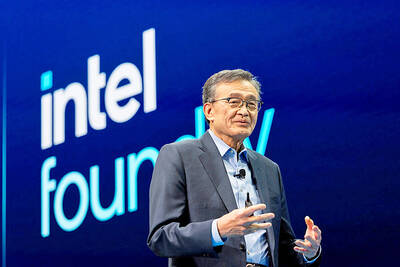Shipments of tablet PCs running Google Inc’s Android operating system surpassed those of Apple Inc’s iPad in the second quarter, thanks to the popularity of smaller models, according to research firm Canalys.
More than 34 million tablets were shipped globally in the April-to-June period, a 43 percent increase from the same period last year, Canalys said in a report on Thursday last week.
Apple, which created the tablet market with its iPad, saw its market share drop to 43 percent during the second quarter, with tablet shipments falling 14 percent from a year earlier to 14.6 million units.
By contrast, Android-based tablets accounted for 53 percent of the global market, as shipments from Samsung Electronics Co, Amazon.com Inc, Lenovo Group Ltd and Taiwan’s Acer Inc (宏碁) each grew annually by more than 200 percent, driven by increasing demand for small-screen tablets, Canalys said.
Canalys estimated that 68 percent of tablets shipped in the second quarter had a screen size smaller than nine inches.
“When Apple does decide to refresh its iPad range it will not experience the buzz of previous launches,” Canalys analyst James Wang said in the report.
“Tablets are now mainstream products and hardware innovation is increasingly difficult. With branded Android tablets available for less than US$150, the PC market has never been so good for consumers, who are voting with their wallets,” he said.
Despite its 53 percent share, Android still lags far behind Apple’s iOS platform in the availability of fully-optimized tablet apps, and tablet app downloads from the Apple App Store dwarf those from Google Play, Canalys said.
However, Android is expected to continue to close the ecosystem lead iOS has in tablets and increase its share in coming quarters, the research company said.
Another survey conducted by display research firm WitsView said that the iPad market share dropped to 35.5 percent in the second quarter of the year, a new low.
That was because Apple’s 9.7-inch regular iPad entered the end of its lifecycle in the second quarter, while the 7.9-inch iPad Mini’s relatively higher price also contributed to slower sales, WitsView said.

Mercuries Life Insurance Co (三商美邦人壽) shares surged to a seven-month high this week after local media reported that E.Sun Financial Holding Co (玉山金控) had outbid CTBC Financial Holding Co (中信金控) in the financially strained insurer’s ongoing sale process. Shares of the mid-sized life insurer climbed 5.8 percent this week to NT$6.72, extending a nearly 18 percent rally over the past month, as investors bet on the likelihood of an impending takeover. The final round of bidding closed on Thursday, marking a critical step in the 32-year-old insurer’s search for a buyer after years of struggling to meet capital adequacy requirements. Local media reports

US sports leagues rushed to get in on the multi-billion US dollar bonanza of legalized betting, but the arrest of an National Basketball Association (NBA) coach and player in two sprawling US federal investigations show the potential cost of partnering with the gambling industry. Portland Trail Blazers coach Chauncey Billups, a former Detroit Pistons star and an NBA Hall of Famer, was arrested for his alleged role in rigged illegal poker games that prosecutors say were tied to Mafia crime families. Miami Heat guard Terry Rozier was charged with manipulating his play for the benefit of bettors and former NBA player and

TECHNOLOGICAL RIVALRY: The artificial intelligence chip competition among multiple players would likely intensify over the next two years, a Quanta official said Quanta Computer Inc (廣達), which makes servers and laptops on a contract basis, yesterday said its shipments of artificial intelligence (AI) servers powered by Nvidia Corp’s GB300 chips have increased steadily since last month, should surpass those of the GB200 models this quarter. The production of GB300 servers has gone much more smoothly than that of the GB200, with shipments projected to increase sharply next month, Quanta executive vice president Mike Yang (楊麒令) said on the sidelines of a technology forum in Taipei. While orders for GB200 servers gradually decrease, the production transition between the two server models has been

BETTER THAN EXPECTED: The firm’s Q3 results exceeded its projections, based on ‘the underlying strength of our core markets,’ chief financial officer Dave Zinsner said Intel Corp returned to profitability and gave an upbeat revenue forecast after PC demand grew, suggesting that it is making progress on a long and challenging comeback attempt. In the third quarter, revenue rose 3 percent to US$13.7 billion. The Santa Clara, California-based company posted its first quarterly net income since the end of 2023, with earnings per share of US$0.23, excluding some items. Analysts had estimated sales of US$13.2 billion and earnings per share of US$0.01 on average, according to data compiled by Bloomberg. Fourth-quarter sales would be roughly US$13.3 billion, the company said in a statement on Thursday. Intel shares gained about